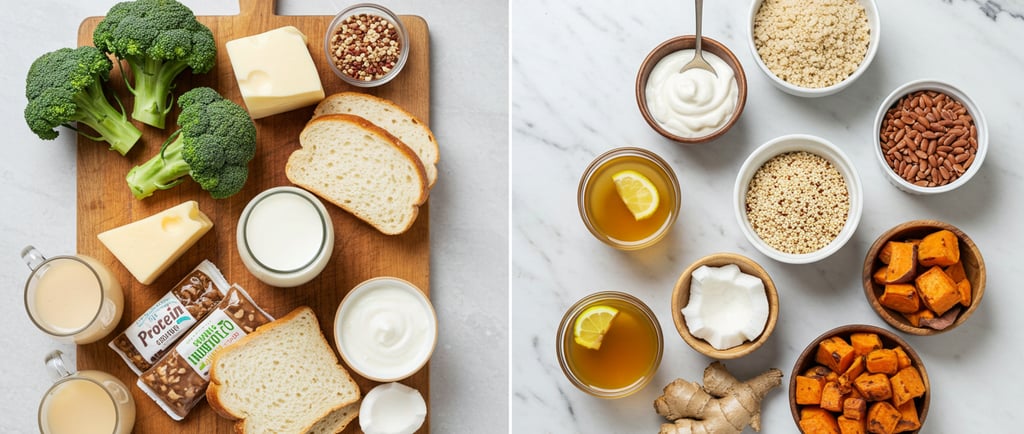How to Stop Menopausal Bloating With These Food Swaps
If your belly feels constantly bloated no matter how “healthy” you eat, your body may be reacting to foods it no longer tolerates well. Menopause changes digestion—slows it down, increases inflammation, and throws gut bacteria off balance. In this article, learn how to swap the most common bloating triggers for gut-friendly, hormone-supportive alternatives that help you feel lighter, clearer, and more in control.
4/5/20253 min read


How to Stop Menopausal Bloating With These Food Swaps
Still bloated—even when you’re eating clean? It’s not just what you’re eating. It’s what your body can no longer process the same way.
Bloating during menopause isn’t just uncomfortable—it’s draining. You eat a salad, and suddenly your stomach feels tight and distended. You sip a smoothie, and you’re gassy and sluggish for hours.
You’re not imagining it. As estrogen declines, digestion slows down, your gut bacteria change, and foods that were once “safe” now create irritation.
But here’s the shift: you don’t have to overhaul your diet. You just need to make strategic swaps that support digestion, reduce inflammation, and help your body work with you—not against you.
Let’s walk through the top bloating culprits in menopause—and the food swaps that can help you feel better fast.
Why Bloating Happens More Often During Menopause
Your hormones and your gut are deeply connected. When estrogen drops, it affects:
Bile production – making it harder to break down fats
Gut motility – slowing how quickly food moves through your system
Microbiome diversity – reducing the “good bacteria” that keep digestion smooth
Inflammatory response – making your gut more reactive to common foods
All of this means you’re more likely to experience bloating, constipation, and gas—even with foods that seem healthy on the surface.
But when you remove the foods causing irritation and replace them with foods that your gut recognizes and can easily digest, the bloating begins to shift.
Food Swaps to Reduce Bloating and Support Gut Balance
Swap: Raw Cruciferous Veggies → Cooked Non-Gassy Vegetables
Raw broccoli, cabbage, and cauliflower are known for their health benefits, but during menopause they can be tough on digestion.
Why raw cruciferous veggies cause bloating:
High in raffinose, a fiber that ferments in the gut
Can overload a slower digestive system, especially if eaten cold or in large amounts
Swap for:
Steamed zucchini, cooked carrots, sautéed spinach, or roasted sweet potato
Lightly cooked cruciferous veggies—like sautéed kale or steamed broccoli—if tolerated
Why it works:
Cooking breaks down the fibrous structure, making these vegetables easier to digest and less likely to ferment in your gut.
Swap: Dairy Milk and Yogurt → Unsweetened Non-Dairy Alternatives
Even if you were fine with dairy before, many women develop lactose intolerance during menopause as enzyme production slows.
Why dairy causes bloating:
Lactose is harder to break down
Conventional dairy often contains hormones that can disrupt your own hormone balance
Can trigger inflammation in the gut lining
Swap for:
Unsweetened almond milk, coconut milk, or oat milk
Coconut yogurt or cashew yogurt with live probiotics
Why it works:
Non-dairy alternatives are gentler on digestion and still offer creaminess without the gut distress. Bonus points if they include probiotics for microbiome support.
Swap: Protein Bars and Powders With Additives → Clean, Whole-Food Protein
Many packaged bars and powders are filled with ingredients your gut can’t process efficiently.
Why processed protein products cause bloating:
Contain sugar alcohols, gums, and artificial sweeteners
Often use whey protein concentrate, which can irritate the gut
Can be low in fiber, leading to slower digestion
Swap for:
A smoothie with pea or hemp protein and whole-food ingredients
A handful of pumpkin seeds with a boiled egg or a slice of tempeh
Chickpeas, lentils, or quinoa in your meals
Why it works:
Whole-food protein sources are naturally rich in fiber and minerals that support smoother digestion and stabilize blood sugar.
Swap: Carbonated Drinks → Flat Herbal Infusions
Even if it’s “sugar-free,” carbonated water can trap gas in your system and worsen bloat.
Why carbonated drinks cause bloating:
Introduce excess gas into your digestive tract
Can delay stomach emptying and create pressure
Artificial flavors can irritate the gut lining
Swap for:
Warm peppermint, ginger, or fennel tea
Flat lemon water
Water with cucumber slices or mint
Why it works:
These soothing beverages relax the digestive muscles, reduce cramping, and help the body naturally release gas without discomfort.
Swap: Refined Grains → Fiber-Rich, Gluten-Free Alternatives
White bread, pasta, and crackers offer little nutritional value—and your gut feels the consequences.
Why refined grains cause bloating:
Low in fiber, high in starch
Spike blood sugar, triggering insulin and inflammation
Feed the wrong kinds of gut bacteria
Swap for:
Quinoa, brown rice, or sweet potato
Lentil pasta or chickpea pasta
Sprouted grain breads (if gluten is tolerated)
Why it works:
These options are rich in fiber, gentle on digestion, and feed beneficial bacteria—all while keeping you fuller longer.
Final Thoughts: Let Your Body Lead, Not the Food Rules
Menopause is a different season. Your body has new needs, and the way you eat needs to reflect that.
Bloating isn’t random. It’s feedback. And when you start swapping out the foods that no longer work and replacing them with ones that truly nourish you—your gut responds quickly.
You don’t need to be perfect. You just need to start making choices that make your body feel calm, clear, and supported.
Start here. Start with your gut.
Get your free MEND Gut-Healing Blueprint now! 👉
Mind Your Menopause
Supporting women through menopause with expert guidance.
team@mindyourmenopause.shop
© 2025. All rights reserved.
